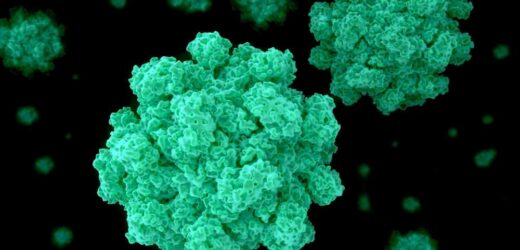A HEALTH alert has been issued across England as cases of the norovirus have soared in recent weeks.
Cases of the norovirus have climbed to levels seen since before the coronavirus pandemic, Public Health England (PHE) said today.
The bug is highly infectious and causes diarrhoea, vomiting and is passed from person to person.
As restrictions put in place due to Covid-19 are lifted, it's likely people will be mixing more with others – meaning there's a greater chance of contracting the bug.
In the last five weeks, 154 outbreaks have been reported, compared to an average of 53 outbreaks reported over the same time period in the previous five years.
The outbreaks have been mainly seen in educational settings, but PHE said this is more than what would usually be seen in the summer months.
Professor Saheer Gharbia, Deputy Director, National Infection Service, Public Health England, said: "Norovirus, commonly known as the winter vomiting bug, has been at lower levels than normal throughout the pandemic with less opportunity to spread between people in the community.
"But as restrictions have eased we have seen an increase in cases across all age groups."
Prof Saheer explained that symptoms include sudden inset of nausea, projectile vomiting and diarrhoea.
"But can also include a high temperature, abdominal pain and aching limbs.
🔵 Read our coronavirus live blog for the latest updates
"Stay at home if you are experiencing norovirus symptoms and do not return to work or send children to school or nursery until 48 hours after symptoms have cleared."
Prof Saheer explained that there are things you can do to reduce the spread of norovirus.
"As with Covid-19, hand washing is really important to help stop the spread of this bug, but remember, unlike for Covid-19 alcohol gels do not kill off norovirus so soap and water is best", Prof Saheer added.
What is norovirus?
NOROVIRUS is a highly-infectious bug often referred to as the “winter vomitting bug”.
According to the NHS website, you are likely to have caught norovirus if you experience a sudden sick feeling, projectile vomiting and watery diarrhoea.
Other symptoms can include a slight fever, headaches, painful cramps and aching limbs.
Norovirus symptoms usually start between 12 and 48 hours of being infected with the bug.
For most healthy people symptoms generally last for around one to three days.
However, there are some unfortunate cases in which the virus can linger in the intestines for weeks – or even months.
There is no cure but the symptoms do often pass after a couple of days.
If you think you have contracted it contact NHS direct but stay at home, as you won’t be offered any treatment in hospital and you could put others at risk by being there.
You can ease the symptoms by doing a few things:
- Drink plenty of fluids and avoid getting dehydrated
- Take paracetamol to ease aches and pains
- Rest – a lot
- Eat plain foods (if you can manage eating)
- Rehydrate with rehydration salts which you can buy in a sachet
- Adults can take antidiarrhoeal tablets
She also explained that when an infected person vomits, the droplets contaminate the surrounding surfaces.
In order to get rid of this you should use a bleach-based household cleaner or a combination of bleach and hot water to disinfect potentially contaminated household surfaces and commonly used objects such as toilets, taps, telephones, door handles and kitchen surfaces.
If you think you have caught the norovirus then you should avoid cooking and preparing meals for others for at least 48 hours after your symptoms stop, guidance states.
This is because norovirus can be spread through food contaminated by the virus when food is handled by symptomatic people/infected individuals.
You should also wash any clothing or bedding that may have been contaminated at 60C and where possible you should use disposable gloves to get rid of it.
PHE added: "Norovirus activity is now increasing and it is possible that unusual or out of season increases could be seen in the coming months. following further easing of Covid-19 control measures.
"PHE’s National Norovirus Surveillance Team will continue to closely monitor all available surveillance data to ensure early detection of any unusual norovirus activity and outbreaks."
Source: Read Full Article



